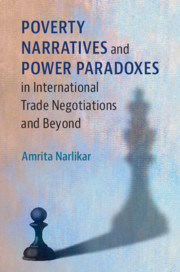Book contents
- Poverty Narratives and Power Paradoxes in International Trade Negotiations and Beyond
- Poverty Narratives and Power Paradoxes in International Trade Negotiations and Beyond
- Copyright page
- Dedication
- Contents
- Acknowledgements
- 1 Introduction
- 2 The Disempowered Many
- 3 Winning against the Odds
- 4 When Fair Is Foul and Foul Is Fair
- 5 Conclusion
- Index
- References
5 - Conclusion
How to Sustain the Power of the Powerless and Build Winning Narratives
Published online by Cambridge University Press: 16 April 2020
- Poverty Narratives and Power Paradoxes in International Trade Negotiations and Beyond
- Poverty Narratives and Power Paradoxes in International Trade Negotiations and Beyond
- Copyright page
- Dedication
- Contents
- Acknowledgements
- 1 Introduction
- 2 The Disempowered Many
- 3 Winning against the Odds
- 4 When Fair Is Foul and Foul Is Fair
- 5 Conclusion
- Index
- References
Summary
Drawing on the empirical detail presented in the previous chapters, I bring together the theoretical and policy implications of this study in Chapter 5. In the first part of this chapter, I offer a brief summary of my research findings, and then develop some generalizations on the life-cycles of narratives. In the second section of this chapter, I develop guidelines that may assist practitioners in building effective narratives as vital instruments of public policy and diplomacy.
Keywords
- Type
- Chapter
- Information
- Poverty Narratives and Power Paradoxes in International Trade Negotiations and Beyond , pp. 188 - 200Publisher: Cambridge University PressPrint publication year: 2020



